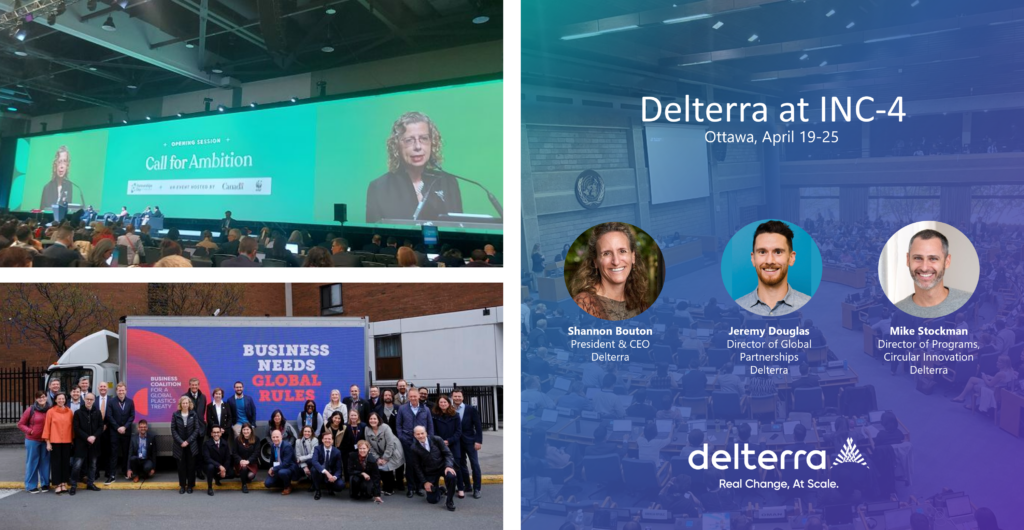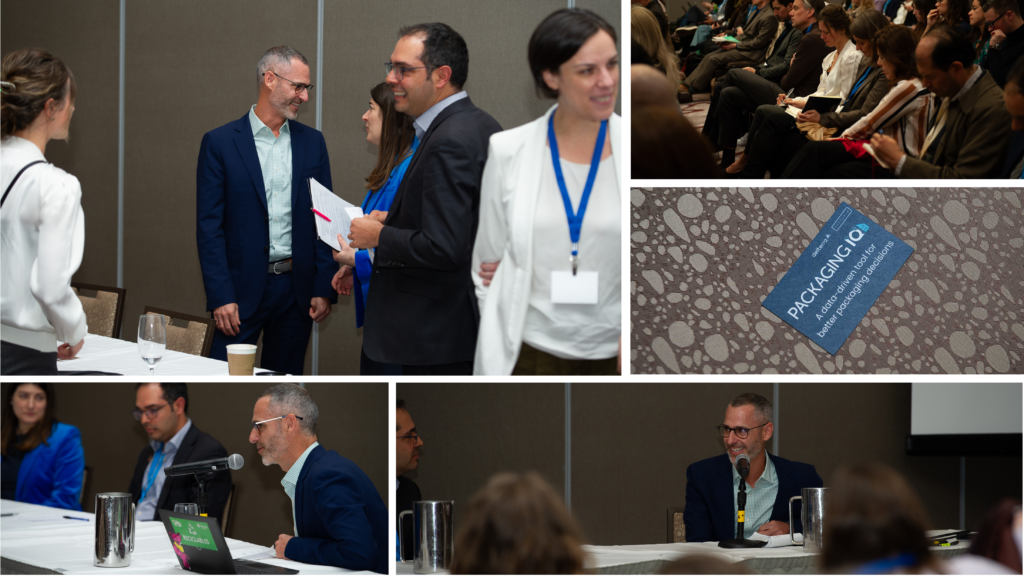A few weeks ago, my colleagues Shannon Bouton, Jeremy Douglas and I traveled to Ottawa, Canada to attend the fourth session of the United Nations Environment Programme’s Intergovernmental Negotiating Committee. Those closely involved in the negotiations, including many from the Business Coalition for a Global Plastics Treaty, were cautiously optimistic that this would be the INC to move beyond procedure and on to negotiating text. I was encouraged by the enthusiasm of delegates and stakeholders as the official start of INC-4 approached.
That optimism held through the week of meetings with negotiators walking away from the table having made some progress. I saw several positive developments in the negotiations, but work remains to be done. Above all, bold, collaborative action is key to getting the treaty over the line and implemented.
The positives
There was increased alignment on key content areas of the treaty, including banning problematic and avoidable plastic products and chemicals of concern; design requirements for future plastic products, including reusable products; financial mechanisms to support implementation of the treaty; and mandated Extended Procedure Responsibility schemes.
Negotiators also agreed on conducting official intersessional work before INC-5 in Busan, Korea in November. This could include country-led technical meetings, conferences and informal consultations aimed at pushing forward key content areas aligned during INC-4. Unfortunately, intersessional work will not include negotiations on actual text or key discussions on production caps.

Where more work needs to be done
Although the governments of Rwanda and Peru proposed a target to cut primary plastic production worldwide by 40% by 2040, the official negotiations yielded little progress towards caps on production and/or measures to reduce consumption of plastics. Many, including myself, believe this continues to be the elephant in the negotiating room. It will be a greatly missed opportunity if policies related to production and consumption of primary plastics polymers are not included in the agreement.
Additionally, there continues to be sound support for Extended Producer Responsibility (EPR) as an enabler to collect, recycle and reuse more plastic. However, as my colleague Shannon Bouton described in a recent post, “there is a relatively common misconception that EPR will single-handedly address the waste management financing gaps in emerging markets”. Negotiators must continue to think holistically about how to support the financing of robust waste management systems as EPR doesn’t provide all the answers.
There is a growing body of evidence on the harmful impact of plastics on human health. This discussion was not included in the official negotiations, but it was highlighted in several side events. One such event, sponsored by Minderoo Foundation, detailed the catastrophic ramifications of plastics production and use on cardiovascular, intellectual and reproductive health.
Opportunities lie in collaborative action
Delterra organized and participated in several events leading up to the start of the official negotiations, including events sponsored by partners from the Alliance to End Plastic Waste (AEPW), DOW, Minderoo Foundation, PREVENT Waste Alliance, WWF, The Recycling Partnership and more.
What stood out to me most about the side events in Ottawa, as opposed to previous INCs, is the non-traditional coalitions forming alongside the treaty negotiations. We are certainly seeing more cross-sector partnerships form amongst the private sector, NGOs, funders, governments, the scientific community and others as stakeholders from across the plastics value chain start to realize that implementation of the treaty will require leveraging the expertise, resources, and relationships of all sectors.

The role of harmonized data and digital tools
Delterra organized two side events alongside INC-4. The first, Enabling Action: How data can advance plastic waste mitigation, co-hosted with Systemiq, SAP, and Earth Action, highlighted the need for further collaboration among data and digital tool stakeholders to enable companies to take action to meet ambitious targets. Panelists included leaders from consumer goods companies, data consulting firms, software companies and research institutions.
Several key takeaways emerged from the discussion. Companies face an uphill climb in their transition from target setting to action. Competing priorities and data disorganization compound the issue. Companies need holistic, internationally recognized plastic footprint metrics, accountability frameworks, and data sets to push decision making. Methodologies like the Corporate Accountability Framework (CAF) can help companies incorporate mitigation efforts, including external financial investment (such as investing in critical waste management infrastructure) into their accountability measures. Digital tools like Packaging IQ can accelerate the shift to more sustainable packaging and waste management through reducing data silos, increasing collaboration across companies and coordinating investments in waste management systems.
Call for a consortium of partners
The second event, a workshop centered on finding solutions to collecting and recycling low-value plastics, was hosted by Delterra and attended by a mix of Delterra Strategic Partners (DOW, Mars, Amcor) and ecosystem leaders (Nestle, EMF, TCI, CGF and others). This working session aimed to identify the building blocks needed for a market-based solution for low-value, post-consumer materials that are currently under-collected and under-recycled.
Participants discussed technologies available to low value materials, with a focus on developing economies, noting that solutions are heavily dependent on the quantity and quality of materials collected through waste management systems. They also called for a decision-making framework for assessing geographical focus and potential market-based interventions, and as well as consortium of partners to focus resources and efforts on a few specific geographies to learn what works and what would scale.
At Delterra, we are focused on building collaborative, diverse and impactful partnerships with players across the value chain. As the treaty negotiations continue leading to Busan and beyond, we will continue to orchestrate the full ecosystem for scalable, sustainable change. Please visit delterra.org to learn how you can partner with us to advance these critical issues.
 This blog was authored by:
This blog was authored by:
Mike Stockman
Director of Programs, Circular Innovation, Delterra
